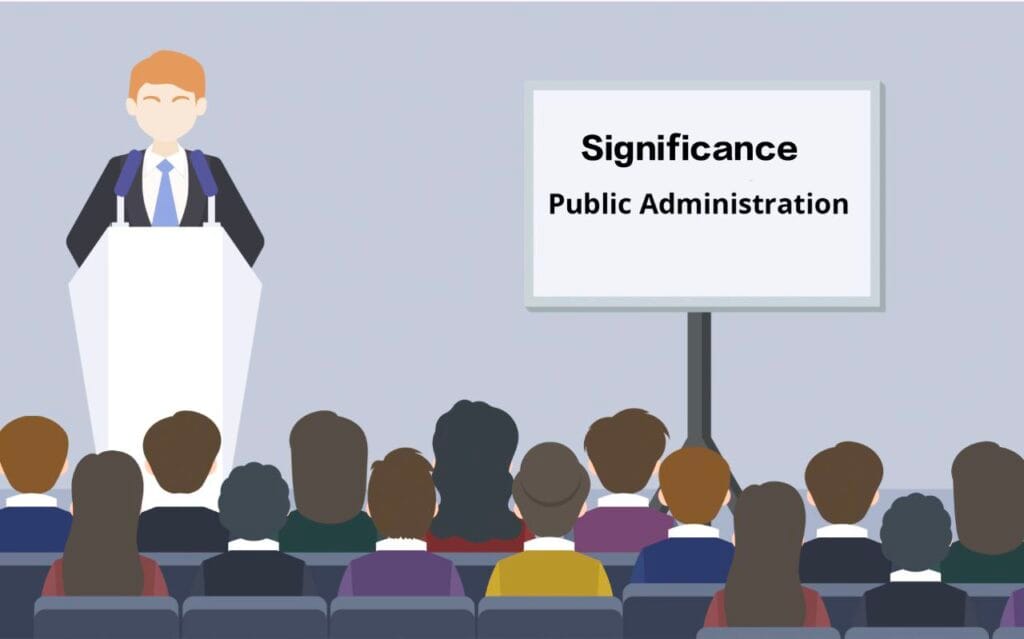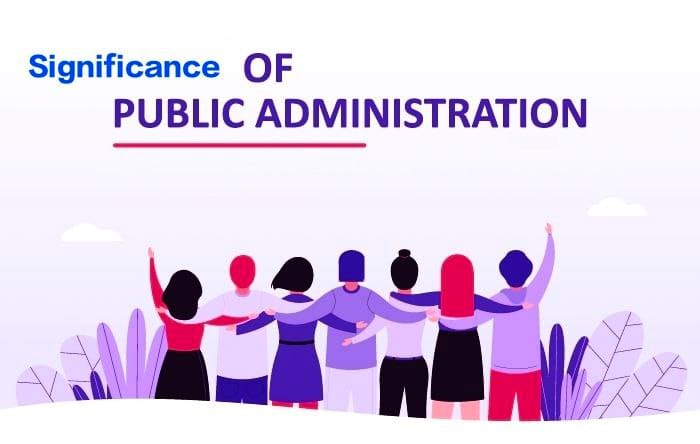
The significance of Public Administration lies in it’s central role in the functioning of governments, the implementation of public policies, and the delivery of essential services to the public. Public administration helps bridge the gap between the state and society, ensuring that the needs and demands of citizens are met efficiently and effectively. Its importance extends across various dimensions, from promoting good governance to fostering development and maintaining social order.
Significance of Public Administration :

1. Implementation of Public Policy
- Public administration is crucial for translating the decisions made by political leaders into practical actions that affect society. It ensures that laws, regulations, and policies are executed properly and consistently.
- Example: After passing environmental protection laws, it is public administration that enforces these laws through regulatory agencies, ensuring that industries comply with environmental standards.
2. Public Service Delivery
- One of the core functions of public administration is the delivery of public goods and services, such as education, healthcare, infrastructure, and security. This ensures the smooth functioning of society and improves the quality of life for citizens.
- Example: Public administrators manage hospitals, schools, and transportation systems, ensuring that these services are accessible, reliable, and of high quality.
3. Good Governance
- Public administration is vital for promoting good governance, which involves transparency, accountability, efficiency, and responsiveness. By ensuring that public services are delivered equitably and efficiently, public administration fosters public trust in government institutions.
- Example: Auditing public finances, ensuring transparency in government contracts, and maintaining open lines of communication with citizens all contribute to good governance.
4. Economic Development and Resource Management
- Public administration plays a key role in managing the economic resources of a country. Through proper budgeting, fiscal management, and economic planning, public administration helps stimulate economic growth and development.
- Example: Governments manage national budgets, allocate resources to various sectors such as healthcare and infrastructure, and promote economic policies that enhance national productivity.
5. Social Welfare and Equity
- Public administration is essential for ensuring social equity and providing support to vulnerable populations. It is responsible for administering social welfare programs like pensions, unemployment benefits, and healthcare services.
- Example: Public administrators design and implement programs that provide food assistance, housing subsidies, and healthcare services to the underprivileged.
6. Regulatory Functions and Law Enforcement
- Public administration enforces the rules and regulations that govern society. This includes everything from regulating industries to enforcing laws that protect public health, safety, and the environment.
- Example: Regulatory bodies like the Food and Drug Administration (FDA) ensure that food and medicines meet safety standards, while law enforcement agencies maintain peace and order.
7. Crisis and Disaster Management
- Public administration is crucial in responding to crises and managing disasters. Public administrators organize disaster relief, allocate resources, and coordinate rescue efforts during emergencies like natural disasters, pandemics, and economic crises.
- Example: During the COVID-19 pandemic, public health administrations coordinated testing, vaccination, and public health guidelines to mitigate the spread of the virus.
8. Institutional Stability and Continuity
- Public administration provides continuity and stability in governance, regardless of changes in political leadership. Bureaucracies and public institutions ensure that government functions continue smoothly even in times of political instability.
- Example: After elections or changes in government, public institutions like the central bank or the police force continue to operate without disruption, ensuring the stability of the state.
9. Human Resource Development
- Public administration also involves the management and development of human resources in the public sector. This includes recruitment, training, and maintaining the welfare of government employees, ensuring that public servants are capable and motivated to deliver services.
- Example: Civil service training programs that equip public employees with the skills needed to manage public policies, handle crises, and deliver services efficiently.
10. Development and Modernization
- In developing countries, public administration plays a pivotal role in promoting socioeconomic development and modernization. It manages projects related to infrastructure development, rural development, poverty alleviation, and healthcare expansion.
- Example: Administrators involved in infrastructure projects like building roads, hospitals, and schools contribute to national development and modernization efforts.
11. Promoting Democracy and Citizen Engagement
- Public administration plays a role in promoting democratic values by ensuring that citizens have access to government services, that their voices are heard, and that they can participate in the policymaking process.
- Example: Organizing public consultations, ensuring free and fair elections, and providing platforms for citizens to express their concerns and suggestions.
12. Adaptation to Global Challenges
- With increasing global challenges such as climate change, migration, and international security threats, public administration is vital for governments to coordinate responses and cooperate with other nations.
- Example: Public administrators in environmental ministries help negotiate international agreements to combat climate change, while national security agencies cooperate in tackling global terrorism.
Conclusion :
Public Administration is indispensable for the functioning of governments and societies. It ensures the implementation of public policies, delivers essential services, promotes social welfare and equity, and supports economic development. Through effective public administration, governments can respond to the changing needs of society, manage resources efficiently, and ensure the stability and continuity of governance. Public administration is central to achieving good governance, fostering democratic values, and promoting development.